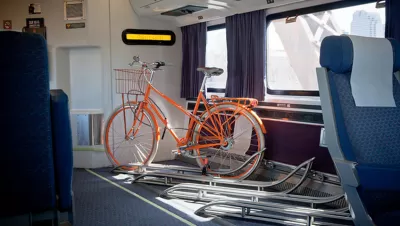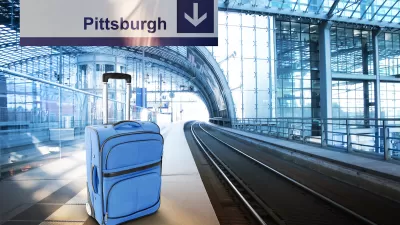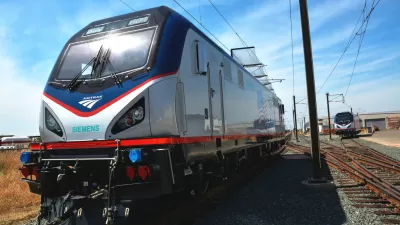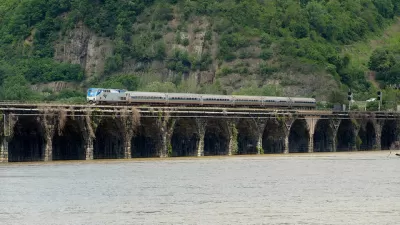It's still not bike-friendly, but it's getting better. The Capitol Limited from Chicago to Washington joins a small list of routes allowing for "roll-on, roll-off," though reservations and a $25 fee may apply.

As anyone who has taken, or attempted to take, their bike on Amtrak trains knows, the procedure is not exactly bike-friendly. "Currently, bikes must be dismantled and packed in boxes and can only be loaded on and off trains at staffed stations, of which there are none between (Pittsburgh) and Washington, D.C.," writes Jon Schmitz for the Pittsburgh Post-Gazette.
"The expansion of bike service [on the Capitol Limited] will take place as early as next week," Amtrak spokeswoman Kimberly Woods confirmed on Thursday.
Reservations will be required and the railroad will charge a $25 fee for the service, even though passengers will be responsible for rolling their bikes onto the trains, securing them, and rolling them off. Only standard-sized bikes will be permitted. The service will be available at all stations on the route, which extends from Chicago to Washington.
The obvious question any bike-and-train traveler must be asking now: If Amtrak can simplify the procedure on the Capitol Limited, why not other routes?
Well—it has! Just this month, bike friendly policies have been adopted for:
- Heartland Flyer (Oklahoma City to Fort Worth): Walk-up bikes are free of charge during this service pilot, but reservations are required—see Bike Service on the Heartland Flyer
- Carolinian: This free service is available on Carolinian Trains 79 and 80 at the Raleigh, Cary, Durham, Burlington, Greensboro, High Point, Salisbury, Kannapolis and Charlotte stations - see Walk-Up Checked Bike Service on the Carolinian
- Northeast Regional: from Philadelphia to Richmond, Va. at select stations from September 15-30. See: "Train to the Championships." The trial appears to be a promotion for UCI Road World Championships, cycling's pinnacle event, in Richmond this September).
These are new services. For ongoing bike policies on train routes, see chart below. It appears to be dated as the numbers of spots may have been significantly increased on some routes, e.g., Capitol Corridor from San Jose to Sacramento.
Standard full-size bicycles may be carried on and stored onboard in bicycle racks on these select certain trains.
| Number of Spots | Bicycle Reservation Required | Checked Service Available | Bicycle Fee | |
| Amtrak Cascades | 10 per train | Yes | Select Stations | $5 |
| Capitol Corridor | 6 per train | No | No | -- |
| San Joaquin | 6 per train | No | Select Stations | -- |
| Pacific Surfliner | 6 per train | Yes | Select Stations | -- |
| Downstate Illinois Services | 4 per train | Yes | No | $10 |
| Blue Water (trains 364 and 365 only) | 4 per train | Yes | No | $10 |
| Missouri River Runner | 4 per train | Yes | No | $10 |
|
Downeaster |
8 per train | Yes | No | $5 |
| Piedmont | 6 per train | Yes | No |
We have many challenges, primarily with our core infrastructure. Among the key issues are finding space for bicycles on our trains and developing the ability to safely and efficiently load and unload bicycles.
Much of Amtrak’s fleet is quite old with many cars more than 40 years old and bikes were not a consideration during the original design. The good news here is new equipment for long distance trains is on the way, featuring design elements that will help on this front. That still won’t help with our station platforms, however, which are of varying heights and present an obstacle for loading and unloading bicycles.
Schmitz describes more aspects of the new bike accommodations on the Capitol Limited. He notes that there is only one train per day for this route [PDF].
FULL STORY: Amtrak ready to allow roll-on bike service between Pittsburgh, D.C.

Alabama: Trump Terminates Settlements for Black Communities Harmed By Raw Sewage
Trump deemed the landmark civil rights agreement “illegal DEI and environmental justice policy.”

Study: Maui’s Plan to Convert Vacation Rentals to Long-Term Housing Could Cause Nearly $1 Billion Economic Loss
The plan would reduce visitor accommodation by 25% resulting in 1,900 jobs lost.

Why Should We Subsidize Public Transportation?
Many public transit agencies face financial stress due to rising costs, declining fare revenue, and declining subsidies. Transit advocates must provide a strong business case for increasing public transit funding.

Paris Bike Boom Leads to Steep Drop in Air Pollution
The French city’s air quality has improved dramatically in the past 20 years, coinciding with a growth in cycling.

Why Housing Costs More to Build in California Than in Texas
Hard costs like labor and materials combined with ‘soft’ costs such as permitting make building in the San Francisco Bay Area almost three times as costly as in Texas cities.

San Diego County Sees a Rise in Urban Coyotes
San Diego County experiences a rise in urban coyotes, as sightings become prevalent throughout its urban neighbourhoods and surrounding areas.
Urban Design for Planners 1: Software Tools
This six-course series explores essential urban design concepts using open source software and equips planners with the tools they need to participate fully in the urban design process.
Planning for Universal Design
Learn the tools for implementing Universal Design in planning regulations.
Smith Gee Studio
Alamo Area Metropolitan Planning Organization
City of Santa Clarita
Institute for Housing and Urban Development Studies (IHS)
City of Grandview
Harvard GSD Executive Education
Toledo-Lucas County Plan Commissions
Salt Lake City
NYU Wagner Graduate School of Public Service





























